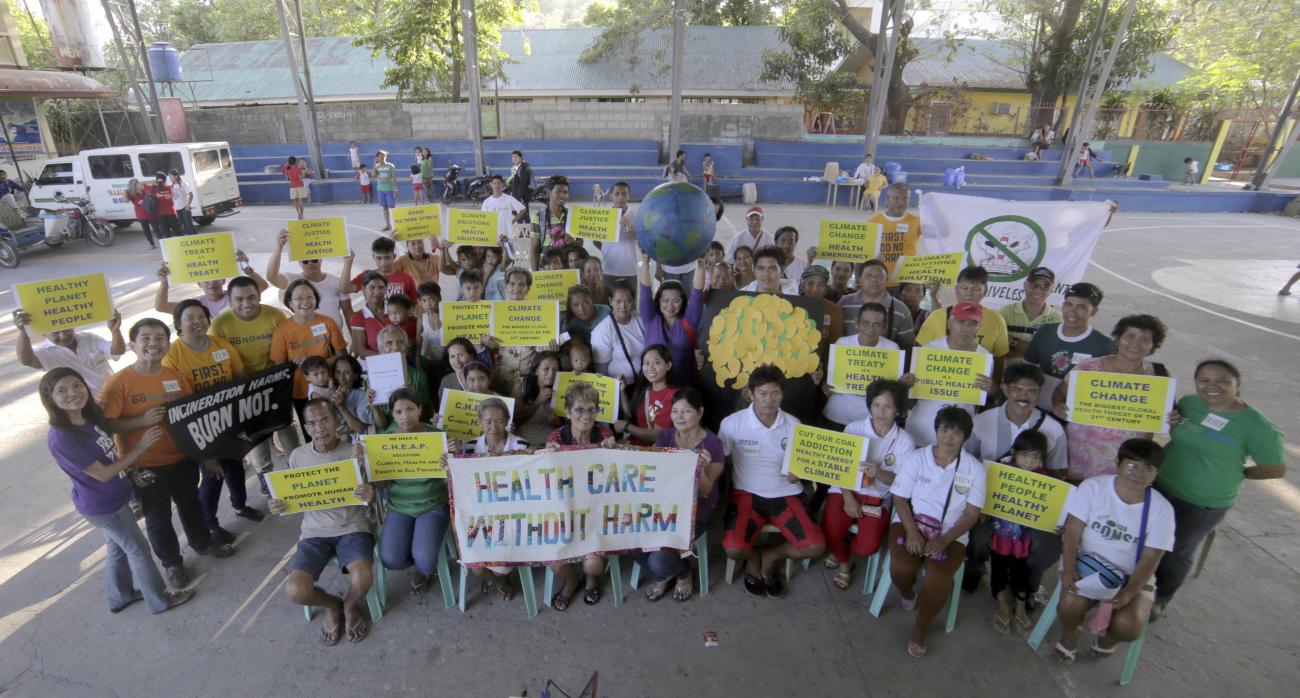Community leaders from the municipalities of Mariveles and Limay in Bataan province called for putting an end to coal use to protect human health and the environment.
As part of its latest campaign Healthy Energy Initiative, Health Care Without Harm (HCWH)-Asia, in partnership with Coal Free Bataan Movement (CFBM) and Defend Zambales (DZ), recently conducted a series of seminar-workshops on coal and health, which aimed to raise community awareness and build consensus around the impacts of coal on human health. More than a hundred community leaders and concerned citizens from the municipalities of Mariveles and Limay in Bataan and Masinloc in Zambales participated in these educational events.
The three municipalities are hosts to operating coal-fired power plants that are planned to be expanded in response to the looming national energy crisis. Currently, Limay hosts a 140-Megawatt (MW) coal-fired power plant that provides electricity to its adjacent petroleum plant, and another 600-MW plant is being constructed. In Mariveles, an existing 600-MW plant is due for expansion to produce an additional 1,200 MW capacity by 2018.
On the other hand, Masinloc hosts one of the oldest and longest-running coal power plant with an installed capacity of 630 MW, commissioned in 1998 under emergency power of then President Fidel Ramos and later privatized in 2007, now under the management of Masinloc Power Limited Corporation, owned by American energy giant AES Corporation. It was approved for further expansion in 2013, installing an additional 600-MW capacity.
In all three municipalities, various health, social, and environmental effects have been observed and documented, such as air and noise pollution, declining fish harvests, and decreasing production of mango – one of the area’s major agricultural products – thereby resulting in loss of livelihood among community members.
During the seminar-workshop, Dr. Renzo Guinto, Healthy Energy Initiative campaigner, gave a presentation detailing the various impacts of coal combustion on both human health and the environment.
“Coal-fired power plants affect people’s health both directly – through air and water pollution – and indirectly – through the pathway of climate change, which has its own set of negative health effects,” said Dr. Guinto. He also pointed out what he called the Philippines’s “climate bipolarism” – the country’s inconsistency in addressing climate change, advocating for better climate adaptation while lagging behind mitigation, such as by ending its addiction to coal and shifting to renewable energy.
Dr. Guinto also emphasized the need to tackle the root cause of the health impacts being observed in communities hosting coal-fired power plants. “Now is the time for us not to just give cough syrup for those who come to the clinic coughing – we need to eliminate what’s ultimately causing the cough – such as coal power plants that emit toxic fumes and hazardous chemicals.”
In Masinloc, Zambales, residents expressed their concern about the community health impacts of one of the oldest coal-fired power plants in the Philippines.
In addition to extensive discussions on the links between coal and health, Engr. Roberto Verzola, an expert on renewable energy who just recently launched his latest book “Crossing Over: The Energy Transition to Renewable Energy,” explained how the Philippines can pave the way towards a transition from coal to clean renewable energy.
“The price of renewable energy, say solar power, is gradually reducing, and soon it will be much cheaper than coal and other fossil fuels. It is not just good for our health – it is also good for our pockets,” stated Engr. Verzola.
The seminar-workshops provided the community with a venue to share personal experiences, raise concerns, ask questions, and discuss possible advocacy strategies. Darwin, a student and member of the indigenous Aeta community in Bataan, recalled the first time he witnessed the air and noise pollution that emanated from the plant. “We should not just advocate against the expansion – we should call for the closing of all operating coal power plants as well. They are destroying our health and environment,” he said.
Fr. Roderick Miranda of Mariveles, Bataan questioned the existence of the coal-fired power plant and even called on fellow community members to question the dominant development paradigm. “Is this the type of development we need – development that puts human lives at stake?” he asked the audience in his opening remarks.
The two seminar-workshops ended with a joint recitation of the “Healthy Energy Declaration” which was drafted jointly by HCWH-Asia, CFBM, DZ, and community leaders from the three municipalities. The Declaration summarized the key learning points as well as major agreements on the subject of coal, its effects on health, its contribution to climate change, and the need for a shift to renewable energy. A copy of the Declaration can be downloaded here both in English and in Filipino.
“We, the people of Mariveles, Limay, and Masinloc, urge the leaders at the national, regional and local levels, as well as the entire community to oppose the expansion of coal-fired power plants that are currently operating as well as the construction of new plants,” reads the Declaration. “[We also urge leaders to] consider the health of both people and the environment in the crafting of policies and implementation of projects pertaining to energy and electricity generation.”
The weekend activity was also attended by medical students from the Asian Medical Students’ Association-Philippines, one of HCWH-Asia’s avid supporter, and Push Media Productions, who recorded the event for a video documentary project to be soon launched.
Health Care Without Harm-Asia’s Healthy Energy Initiative and the medical students from the Asian Medical Students’ Association-Philippines joined the members of Defend Zambales in front of a coal-fired power plant located at Bani Point, Oyon Bay, Masinloc, Zambales.
